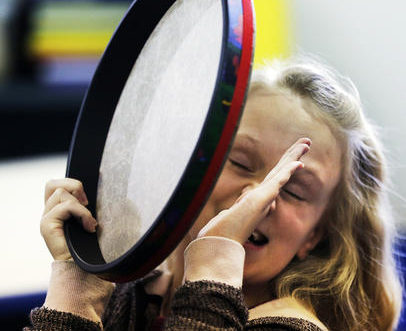5 Reasons to Include Music Therapy in Special Education
Music Therapy in special education has a huge impact on students. It lights up students who are otherwise closed off, it teaches students who are otherwise stuck, and accelerates learning for those with learning delays.
We have seen incredible student progress using music therapy in a variety of school settings, including those with severe and profound disabilities, as well as those with mild to moderate special needs. Any student with special education needs can benefit from music therapy.
Here are some of the reasons to include music therapy in special education programs.
#1 Music Accelerates Learning
The reason music therapy works is because it taps into learning areas of the brain that are inaccessible through traditional education. Music lights up every part of the brain, and for a student who doesn’t understand certain concepts when presented verbally, visually, or even kinesthetically, music can fill in the gaps and dramatically increase understanding and memory.
In addition to cognitive & academic development music can help students make gains in speech and language, social skills, motor coordination, and emotional well being. And we all know that education is about more than academics—we need to prepare students with life skills in all areas of development.
Music therapy does all of that simultaneously.
And because students love music, music therapy makes the learning process fun!
What more could we ask for in educating our students? Enjoyable and effective—that’s the whole package with music therapy.
#2 Students Love Learning Through Music
Because music is highly motivating and fun for students, it is a very engaging and effective way to teach concepts and enhance development. As music therapists we have the privilege of being “the good guys” because students are always excited for ‘music time’!
And because they enjoy it, we typically see faster results.
#3 Music Impacts All Areas of Development
As a society we grossly underuse the wonder of music, and tend to be unaware of the broad impact it has on learning and development. Rhythm enhances coordination and understanding of patterns, reading music supports reading skills, singing enhances communication, language awareness, and speech development, playing music with a group actively teaches social skills, and active engagement in music has a direct impact on educational concepts such as 1:1 correspondence, phonemic awareness, and spatial reasoning.
The impact is huge, and music therapy utilizes that impact to directly support student progress.
#4 Students Often Progress Faster With Music Therapy
In our work with students in special education settings, we have found that students perform better on the same IEP goal when using music therapy compared to non music settings. On average, these students achieve at levels 25-35% higher with music therapy than without.
Just check out our post on Data from Utah Schools for more insight into this huge difference.
#5 Music Therapy is a Related Service under IDEA
It’s a little known fact that music therapy is considered a related service under the Individuals with Disabilities Education Act. It is specified in clarifications of the law, and is considered to be a related service every bit as much as speech therapy, occupational therapy, and physical therapy.
For students who have needs in academics, social skills, communication, emotional well being, motor skills, or pre-academic areas, music therapy can play a vital role in helping them learn and progress at a faster rate than with traditional approaches.
In fact, when comparing student progress on the same IEP goal in music therapy vs. traditional approaches, we have found that students perform an average of 25% better in music therapy than in other settings.
Music therapy as a related service accelerates student’s educational development.
Questions about how to include music therapy in your school? Contact Us!


[…] 5 Reasons to Use Music Therapy in Special Education […]
[…] 5 Reasons to Use Music Therapy in Special Education […]